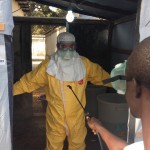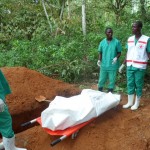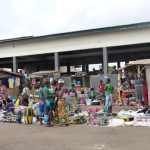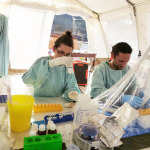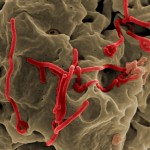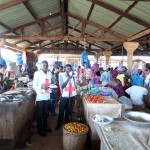The CLEME (Community Led Ebola Man- agement and Eradication) programme aims at triggering the behavioural change needed by the communities to strengthen community resilience to the outbreak and prevent further resurgence by ensuring real and sustainable improvements through: Providing the communities with the means to conduct their own appraisal and analysis of the Ebola outbreak, their safety regarding the disease and its con- sequence if nothing is done; Instilling a feeling of urgency in engaging in community actions that will prevent the community experiencing infections; Supporting
Continue reading →
Ebola Virus Disease (EVD) home deaths occur as the result of infected persons not being detected early and sent to Ebola Treatment Units (ETU) where they can access care and have an improved chance of survival. From a public health standpoint, EVD deaths should not occur at home. Individuals suspected of being infected with EVD should be identified through case investigations or contact tracing efforts and then referred to an ETU, thus decreasing their risk of dying as well as minimising the risk of exposing
Continue reading →
Dr. Ernest Bai Koroma, the president of the Republic of Sierra Leone, was having trouble “getting to zero,” and his underlings were getting antsy. “We need one more push,” said Major Palo Conteh, the commander of Sierra Leone’s National Ebola Response Centre (NERC) and a former Olympic quarter miler. “It’s like in the 400 meters when you’re 20 meters from the finish line, that’s the time to kick hard.” Brigadier General David Taluva, a jovial officer with the physique of a shot putter, had other
Continue reading →
Conflicting messages on the length of time that Ebola remains in semen after recovery make education and prevention confusing. We need to avoid mixed messages and focus on girls’ rights, says anthropologist Pauline Oosterhoff. When I met members of a women’s secret society in Sierra Leone this February, they proposed drastic measures to stop Ebola from spreading through sexual contact. All survivors should be quarantined for three months, they said. Male survivors need to be locked up because they cannot control their urge to have sex. Women
Continue reading →
A component of the Ebola epidemic control policy in Sierra Leone is triage and isolation in decentralised Community Care Centres (CCCs) or Holding Units, from where transfer to Ebola treatment units (ETUs) is arranged for those diagnosed as positive. The epidemic is currently waning, there are sufficient beds in the ETU, yet new micro-epidemics emerge, raising questions about the future role and relevance of the CCC. This briefing summarizes the preliminary findings of a formative evaluation conducted by the UK based Ebola Response Anthropology Platform
Continue reading →
This issue of Limn on “Ebola’s Ecologies” examines how the 2014 Ebola outbreak has put the norms, practices, and institutional logics of global health into question, and examines the new assemblages that are being forged in its wake. The contributions focus on various domains of thought and practice that have been implicated in the current outbreak, posing questions such as: What has been learned about the ambitions and the limits of humanitarian medical response? What insights are emerging concerning the contemporary organization of global health
Continue reading →
The four villages in this report are found on the edge of the Gola Rainforest National Park, Sierra Leone and have been studied by members of the present team at intervals since 1987. The aim of this long-term study was to understand social composition and social change in forest-edge communities, and how these communities were adapting to conservation rules and opportunities. These villages have now been restudied as part of the SMAC community mobilization program for prevention of Ebola Virus Disease. This study, which was
Continue reading →
This report provides further output from an anthropological study of 25 villages affected by Ebola Virus Disease in eastern and central Sierra Leone, undertaken as part of the DFID-funded social mobilization initiative for Ebola prevention in Sierra Leone. Eight focus group transcripts for 3 villages in Kenema District are presented, covering local responses to health issues, and Ebola in particular. Supporting material from a matching questionnaire-based study of health behavior and perceived causes of Ebola is also provided. Of particular relevance are two summary tables
Continue reading →
In a recent interesting contribution to this platform, Paul Richards rightly questioned the mainstream perception that funerals per se are source of contamination in countries affected by ebola. The author argues that funerals are phenomena which are extremely interrelated to other different aspects of social life, like the overall care of sickness, the concept of authority, and the logic of parenthood. Yet, his brief paper has another value: by stressing the complexity of this social phenomenon, it tunes down the journalistic emphasis that in past
Continue reading →
The American Anthropological Association / World Council of Anthropological Associations/ Wenner-Gren Foundation Emergency Initiative on the Ebola Outbreak, is bringing together anthropologists from around the world with expertise in Guinea, Sierra Leone, Liberia, and Nigeria, other Ebola-affected regions, and in infectious disease management for a workshop to address critical issues in the current Ebola outbreak. The workshop will generate a series of short briefing papers that provide actionable guidance to real-time actors in the field for how to proceed with technical, political, social, and economic
Continue reading →
